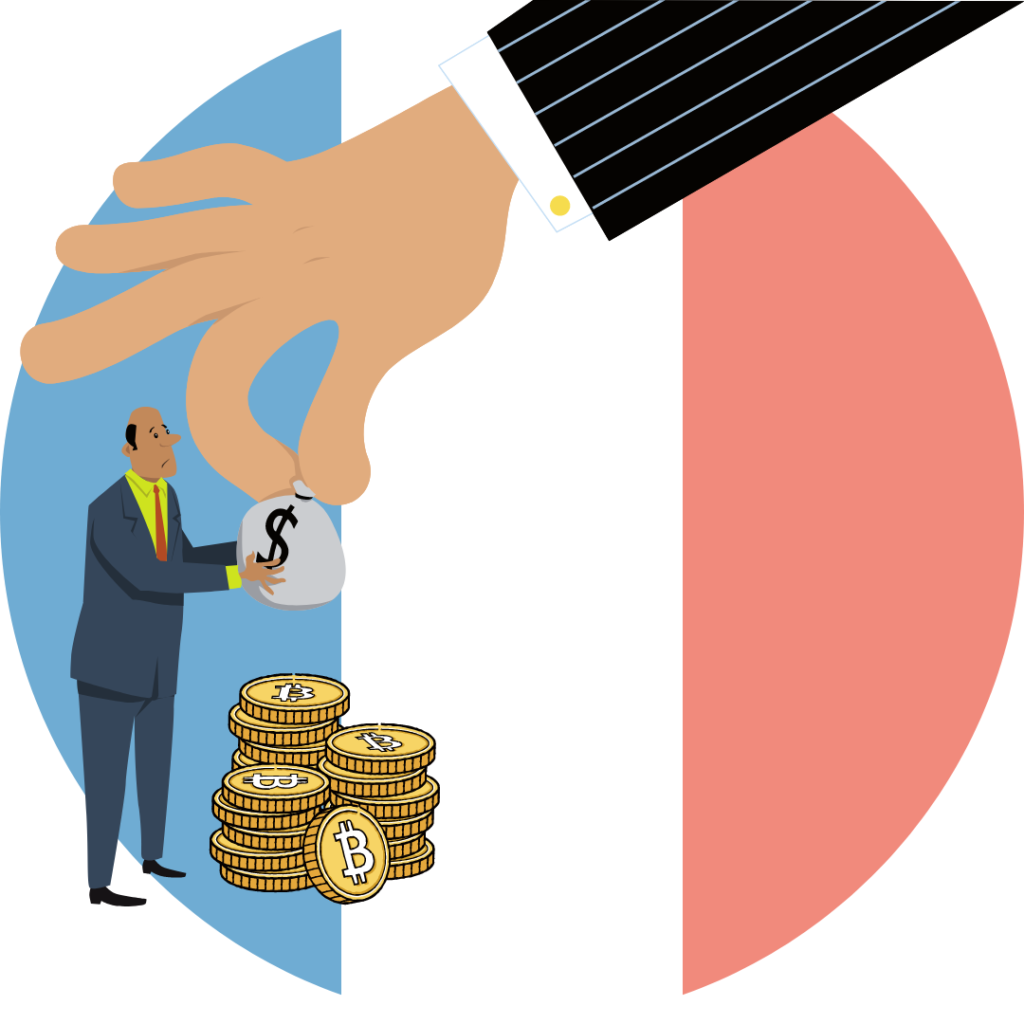Crypto Taxes in France: In-Depth Guide
Crypto taxes in France are fairly simple –
If you’re an occasional trader, you pay a 30% flat tax rate on capital gains. Otherwise, it’s a 0-45% tax rate in case you’re a professional trader.
However, the devil is in the details. The key is how you differentiate between an occasional and a professional trader. Plus, there are many other nuances that you might miss looking at only on the surface.
Let’s take a deeper look into how crypto taxes in France work and what are some things you should know.
How Does the General Directorate of Public Finances View Cryptocurrency?
The General Directorate of Public Finances or Direction Générale des Finances Publiques (DGFiP) classifies cryptocurrency as moveable assets.
However, they are treated the same way as stocks, securities and bonds for tax purposes.
How is Crypto Taxed in France?

Since crypto is treated the same way as stocks, securities and bonds, it’s taxed under income taxes in France, meaning you’ll pay income taxes on disposing of your cryptocurrency.
However, it’s important to point out that France’s definition of crypto disposal is slightly different than most countries.
Unlike most countries, France doesn’t consider swapping crypto as disposing of one cryptocurrency to buy another. Therefore, swapping crypto is actually a tax-free transaction in France.
Selling and spending crypto, on the other hand, is still seen as disposal of assets, hence, a taxable event.
Occasional Trader Vs Professional Trader
Crypto taxes in France vary based on whether you qualify as a professional trader or an occasional trader.
The following are the three main factors, though there could be more, that determine which one you would fall under:
- Total invested amount
- Total trade volume
- Frequency of crypto sales
Now, let’s find out the different tax consequences for both occasional and professional traders.
Professional Trader
If you’re a professional trader, you’ll pay progressive income tax (BIC) of 0-45%, which varies based on your income bracket.
Occasional Trader
If you’re an occasional trader, you’ll pay a 30% Single Fixed Levy (PFU) tax rate, better known as the flat tax, on your crypto gains. The 30% is made up of a 12.8% income tax rate and 17.2% social security contributions.
The flat tax rate isn’t dependent on income brackets or other factors. Everyone who qualifies as an occasional trader must pay the 30% tax on their crypto gains. It’s applied in particular to the selling of investment instruments like crypto, dividends, securities, etc.
On a side note, being an occasional trade, you can still opt-in for the progressive income tax (BIC) rates by ticking box 20P in Formulaire N°2042. But there are a lot of complexities involved. It’s best if you speak to a crypto tax professional about this.
Remember, you’ll pay taxes if you exceed €305 in capital gains in one financial year. Otherwise, you don’t have to pay any taxes whether you’re an occasional or professional trader.
Note: According to the new tax reform in France that will come into effect from 1 January 2023, there will no longer be different tax implications for occasional and professional traders. Instead, all taxpayers would pay a uniform tax rate of 30% flat tax on any crypto gains.
Crypto Mining
Crypto mining or similar activities like staking or lending crypto or even just receiving crypto as income are all subject to the 45% non-commercial profits (BNC) tax rates. You could also be subject to the micro BNC tax rates if you earn less than €70,000.
You’ll pay income taxes when you sell these received cryptocurrencies in the future.
How to Calculate Crypto Taxes in France

To understand how to calculate crypto taxes in France, you must know what these terms mean –
Cost basis – The cost at which you acquire a particular cryptocurrency. This may also include gas fees and other costs.
Fair Market Value (FMV) or Selling Price – The price at which a particular cryptocurrency is selling for in a free, independent market at a point in time.
Capital Gain – The difference between the cost basis and FMV of your crypto.
Cost Basis – FMV = Capital Gains
You’ll pay income tax rates on your capital gains.
Similarly, if you receive crypto as income or reward, you’ll pay BNC tax rates or other tax rates on the FMV of the crypto at the time of receiving it.
And this FMV will become the new cost basis of your crypto for when you sell them in the future.
Crypto Taxable Events
The following are some of the more common crypto transactions and their tax consequences.
Selling or Spending Crypto
As discussed, selling or spending crypto will attract income tax. However, the tax rate you pay will depend on whether you’re an occasional trader or a professional trader.
Mining Rewards
Mining rewards in France typically attract a 45% BNC tax rate.
Staking Rewards
The DGFiP has not provided clear guidelines on how staking rewards or other similar activities like crypto loans or yield farming will be treated.
But based on existing laws and frameworks, it seems the same treatment as mining rewards is most plausible.
Tax-Free Crypto Transactions
The following are crypto transactions that have no tax consequences.
Swapping Crypto
Unlike other countries, swapping crypto in France is non-taxable, which actually opens up a great opportunity to save more taxes, which we’ll discuss in the next section.
Buying or HODLing Crypto
You can buy and hold crypto for as long as you want without paying any taxes. It’s only when you sell or dispose of your crypto that you’ll be liable to taxes.
Airdrops
You don’t have to pay any taxes on crypto received as airdrops. It’s tax-free.
Gifting Crypto
Gifting crypto is like gifting anything else in France. Also, as you might remember, the DGFiP only considers the selling and spending of crypto as a disposal event.
So, if you’re gifting crypto, you’re not actually disposing of your crypto. Only if the recipient sells the gifted crypto in the future that they will be subject to the appropriate income taxes.
How to Avoid Crypto Taxes in France

Firstly, let us clarify that we’re not encouraging you to avoid taxes completely, as that will be tax evasion.
In France, you’ll pay a fine of €750 for each unreported account or €125 for omission or inaccuracy for a declaration under €10,000. If the declaration amount exceeds €50,000, the fines go up from €750 and €125 to €1500 and €250, respectively.
That being said, there are some crypto tax-saving strategies you can deploy to reduce your overall tax liability.
The most common is tax-loss harvesting, where you intentionally realize losses on underperforming assets to offset gains and reduce taxes.
Other than that, the way crypto taxes in France works, you get some additional benefits in terms of taxes.
For example, since swapping crypto is not taxable in France, you can swap your crypto instead of selling them and realizing a profit. Similarly, since gifting crypto is tax-free in France, you can avoid paying taxes by gifting some to your spouse.
You can hire a crypto tax professional, as they can help you look for more ways to reduce your tax liability.
How to Report Crypto Taxes in France
Make sure you keep all relevant records and transactional data to report your crypto gains, losses and income. You can file your taxes online on FranceConnect.
As for the specifics of reporting and filing your taxes, you need four forms in total –
Formulaire n°2042 – This is your main tax form. This is where you report all your taxes, including employment taxes, capital gains and losses made from different assets and crypto, and more.
Along with that, you have to attach the following three forms as well.
Formulaire n°2086 – This form requires you to fill in all the relevant information related to your crypto gains and income.
However, note that you can only fill up 20 itemized disposals in this form. If you have more disposal than that, which you’ll probably do if you’re a professional trader, you have to talk to a tax professional to figure out a way around it.
Formulaire n°2042 C – This one is simple. You have to report the total amount in gains and income on this. If you made a net capital gain, fill in line 3AN. Otherwise, fill in line 3BN to report a net capital loss.
Formulaire n°3916-bis – This doesn’t apply to everyone, but you might still have to attach this anyway. This form is for people trading crypto with foreign currency or having accounts opened outside of France.
If all of this sounds super confusing and overwhelming, try using Bitcoin.Tax.
Most active crypto users use a crypto tax software to sort through their trade history and report taxes. It’s quite challenging without one.
Bitcoin.Tax automatically collects all your transactions, calculates your taxes, and creates a tax report for you, while you can just sit back and relax.